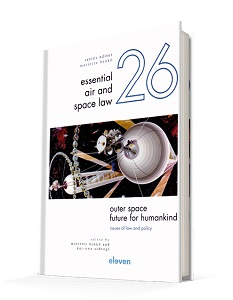To those not directly involved in the field, space law can seem a little esoteric – arguably classified among our ‘first world problems’; indeed, it is often characterised as a hindrance rather than an empowering force. But this book on issues of space law and policy is about as practical as a tome on legislation and process can get. Even its title – “Outer Space - future for humankind” - implies a fundamental forward-looking pragmatic stance.
The titles of its multi-author contributions certainly reflect the current buzz-words of the space sector, such as NewSpace, sustainability and space traffic management. As the editors say in their introduction, because our knowledge of space and the “fragility of this valuable environment” is still limited, we are “facing fundamental questions with respect to the sustainable use of outer space” and other issues such as debris, nuclear power sources and protection of the ozone layer during launches.
The contents of the book – the result of a collaboration between authors and editors in 16 nations – are divided into two main parts entitled ‘Looking Ahead’ and ‘Conflicts and Challenges’; a third section provides context on ‘legal visionary’ George S Robinson who inspired the contributors of this volume.
As one has come to expect from space law books, there is precious little in the way of illustration, beyond the sci-fi images of the introductory chapter and a valiant attempt to introduce the ‘visual ethic’ to a chapter on nuclear power and propulsion. It’s not that the subjects of the other chapters fail to lend themselves to illustration; it’s more that space lawyers seem to harbour a collective opinion that illustration of their subject matter is either infeasible or unnecessary. While I admit that a few pretty pictures would not justify the eye-watering price of this volume, it might make it more attractive and accessible to budding young space lawyers. Oh yes, and a book like this really should have an index!
Criticisms aside, the subject matter of the book is too important to ignore in an era of renewed space commercialisation and development. A key aspect that comes to the fore in any contemporary writing on space law is the fact that existing space law – as enshrined in the 1967 Outer Space Treaty and its offshoots – is not directly applicable to many of today’s promised space applications. Moreover, new space laws are unlikely to develop quickly enough to cover the entrepreneurial developments of individual, sometimes ego-driven, space ventures.
Having written a book on protection of the space environment (Space: The Fragile Frontier, AIAA, 2006), I would be the first to agree that we need to develop a sustainable approach to space development… but it is more likely to be based on protecting the ‘asset value’ of space resources than the rule of international law.











